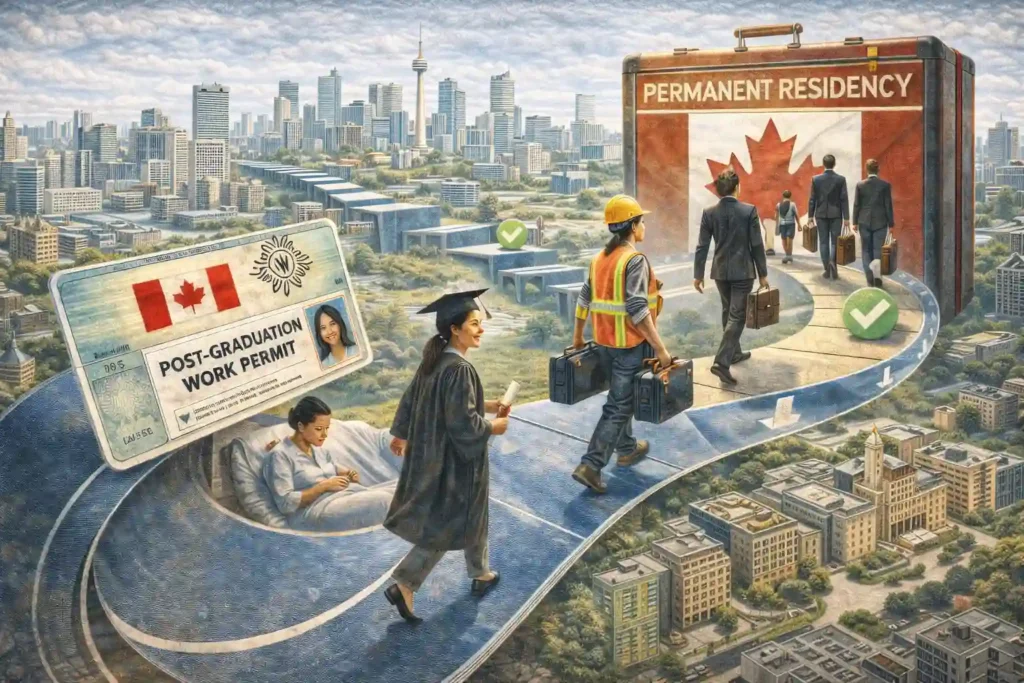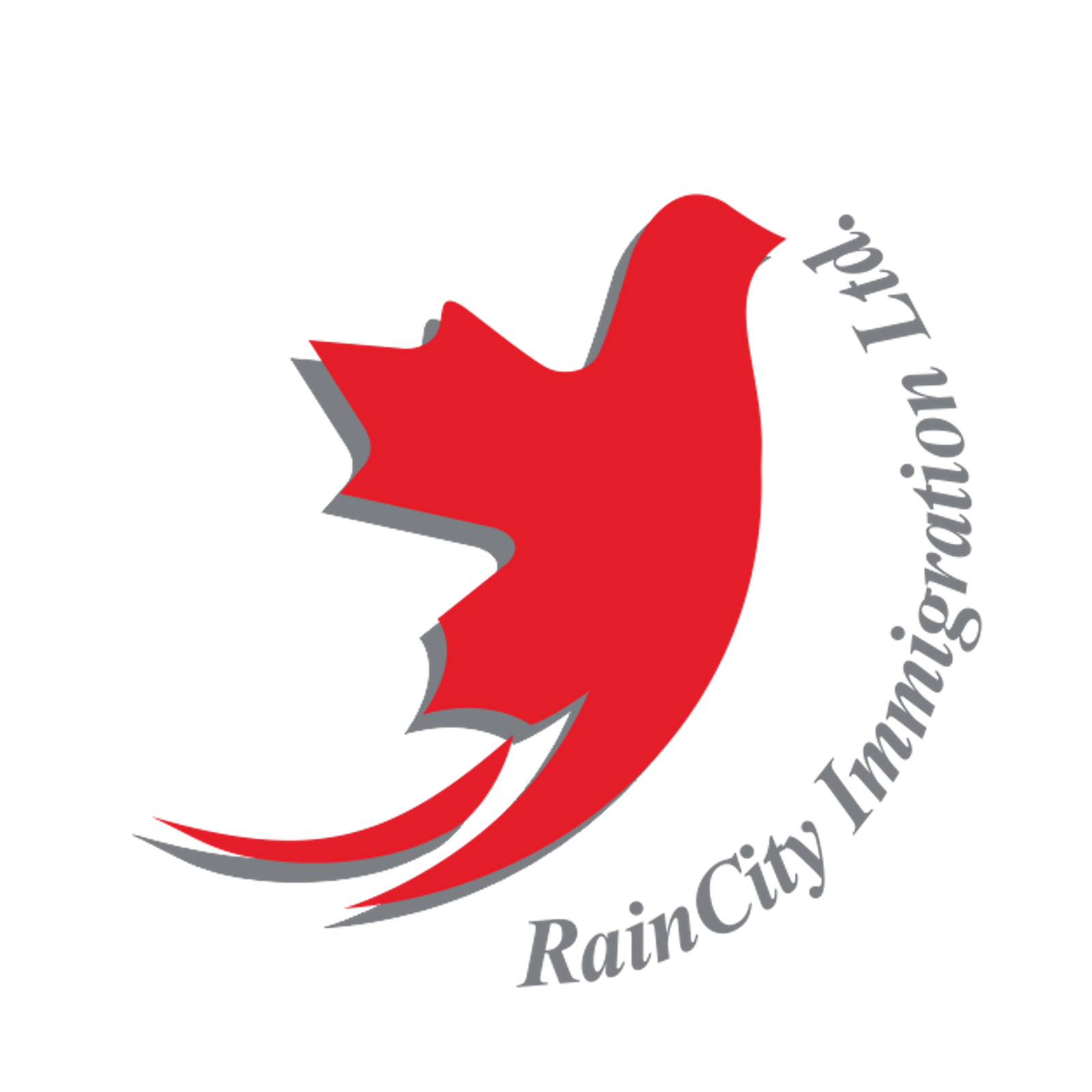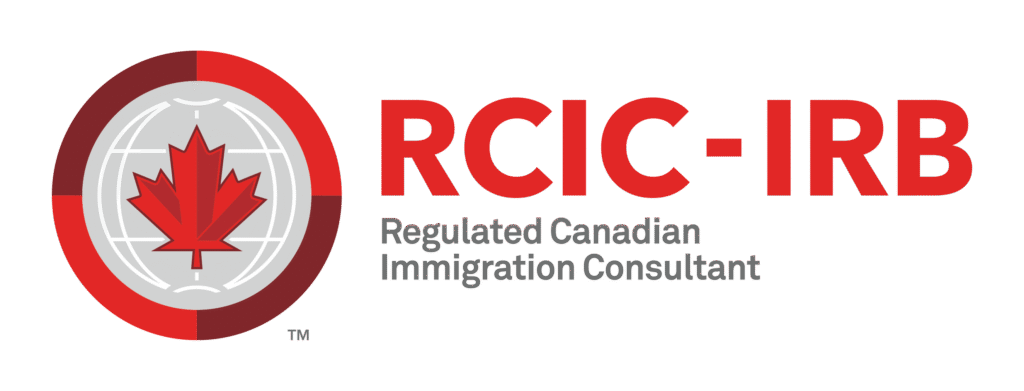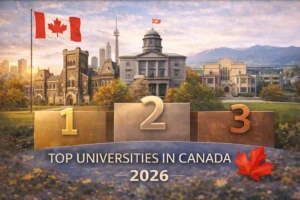Post-Graduation Work Permit (PGWP) in Canada

International students who have completed their studies beyond the high school level in Canada have the opportunity to apply for a Post-Graduation Work Permit (PGWP) and, upon receiving this visa, stay in Canada and gain Canadian work experience.
The work experience gained during this period allows them to apply for permanent residency through the Canadian Experience Class (CEC).
Latest News
Students graduating from Canadian universities need a language certificate with a CLB 7 level to receive the PGWP, while graduates from Canadian colleges will need a CLB 5 language certificate for the same permit.
Those graduating from universities and colleges in Canada (except at the bachelor’s, master’s, and doctoral levels) must have studied in fields that are required by Canada to be eligible for the PGWP. This rule applies only to individuals who submit their study applications on or after November 1, 2024.
Master's students whose programs are less than two years long are eligible for a three-year work permit after graduation.
The Post-Graduation Work Permit is one of the Canadian government’s initiatives to attract international students and retain them as skilled workers. Once you graduate in Canada, you can apply for this type of visa without having a job offer from Canadian employers and can work full-time for any Canadian employer in any field starting from the moment you submit your application, provided your study permit is still valid.<br>
Through the Post-Graduation Work Permit program, you can obtain an open work permit for up to three years. The exact validity of this work permit is based on the length of the program you graduated from, which we will explain further below.
Duration of Post-Graduation Work Permit in Canada
The duration of the PGWP is a maximum of three years and at least as long as your study program in Canada. Work permits are not issued for programs that are less than eight months long.
If part of your education was completed outside of Canada and you then transferred as a transfer student to Canada, as long as your document is issued from Canada and your time spent in Canada is more than 8 months, you will be eligible for a work permit after graduation.
In summary, the validity period of the work visa after studying in Canada is as follows:
Study program less than 8 months
Ineligible for a work visa.
Study program from 8 months to less than 2 years
Work visa for the length of the study program.
Exception: Master’s degree graduates qualify for a 3-year work visa (even if their program is less than 2 years).
Study program of 2 years or more
3-year work visa.
Example 1: If you studied for a bachelor’s or PhD program for 4 years, you will be granted a 3-year work visa.
Example 2: If your master’s program was 2 years long, your work visa will be for 3 years.
Example 3: If your master’s program was 1 year long, your work visa will be for 3 years.
Example 4: If you have completed a 9-month college program, your work visa in Canada will be for 9 months.
There is only one opportunity to obtain a work visa after graduation from the Immigration, Refugees and Citizenship Canada (IRCC).
Requirements for a work visa after graduation in Canada
General conditions
If you meet the following conditions, you can apply for a post-graduation work permit (PGWP):
You must have completed your studies at an academic or vocational institution in Canada. The duration of the program must be longer than 8 months.
This program must lead to a degree or diploma.
Your residency status must have been legal throughout your studies, and your enrollment must have been full-time.
You need to have graduated and received an official letter from your university confirming the completion of your studies.
You may receive your diploma a few months after graduation. Therefore, you can use the official letter from your university and your transcript to apply for the post-graduation work visa.
You must have graduated from one of the following institutions:
Public institutions offering programs above high school level, such as colleges, technical and vocational institutions, universities, or CEGEP in Quebec. These institutions must be designated learning institutions (DLI) approved by the Canadian immigration authority.
Private institutions offering programs above high school level and operating under regulations similar to those of public institutions.
You must have graduated from a recognized private institution in Canada that is authorized to grant degrees (e.g., bachelor’s, master’s, or doctoral degrees) according to local laws.
If you meet all conditions except for full-time studies in your final semester, you can still apply for a post-graduation work permit (PGWP). For example, if you only need to complete two courses in your last semester and you aren’t enrolled full-time, you are still eligible for the post-graduation work visa.
If you graduated from Quebec, the conditions for the post-graduation work permit differ somewhat.
For example, you need to have graduated from a recognized educational institution in Quebec. For more information on this, check out how to obtain permanent residency in Canada through the PEQ.
New Specific Conditions
If you submitted your study permit application before November 1, 2024
If you’ve graduated from a bachelor’s, master’s, Ph.D., or any other program at colleges or universities in Canada, you need to have a language certificate at the CLB 7 level. If you’ve graduated from college programs in Canada, you need to have a language certificate at the CLB 5 level.
If you submitted your study permit application on or after November 1, 2024
If you’ve graduated with a bachelor’s, master’s, or Ph.D. from universities in Canada, you must have a language certificate at the CLB 7 level. All fields of study are eligible. If you’ve graduated from other programs at universities in Canada, you need to have a language certificate at the CLB 7 level as well. You should also have studied in one of the fields needed by Canada. If you’ve graduated from college programs in Canada, you need to have a language certificate at the CLB 5 level. Your field of study must also be among the fields needed by Canada.
List of fields needed by Canada for PGWP
If you graduate from colleges in Canada or from study programs other than bachelor’s, master’s, and Ph.D. from Canadian universities, your field of study must be in one of the following areas:
Agriculture and food industries
Health
Basic sciences, technology, and engineering
Technical and vocational
Transportation
Education fields
Who is not eligible for PGWP?
Those who have previously obtained a work permit after graduation.
Those who completed English or French language courses as a second language.
Those who participated in general courses and personal skills enhancement programs.
Students from private colleges who are enrolled in programs in partnership with public colleges.
Those who benefited from the Government of Canada Awards Program funded by GAC.
Those who participated in the Equal Opportunity Scholarship, Canada-Chile.
Those who participated in the Canada-China Scholars Exchanges Program.
Those who participated in the Organization of American States Fellowships Program.
Those who have taken part in the Organization of American States fellowship.
Those who completed most of their studies online and remotely.
Those who studied at a non-Canadian institution located in Canada (regardless of the duration of study and residency in Canada).
Required documents for applying for a PGWP.
To apply, you need one of the following documents:
Graduation certificate
Official final transcript
A formal letter from the university confirming the student’s graduation
A valid study permit
A valid passport
A passport-sized photo (3.5 x 4.5 cm)
Relevant forms
Deadline for applying for a Post-Graduation Work Permit (PGWP)
Deadline for applying for a Post-Graduation Work Permit (PGWP) in Canada is 180 days (six months). This period starts from the day you graduate. This means you can apply after receiving your transcript and the formal letter from an institution that holds a DLI, which are necessary for applying for a work permit after graduation.
Very Important Note
When applying for a Post-Graduation Work Permit, you must have a valid study permit, and it should not have expired.
If your study permit expires before you receive your transcript, you have two options:
1. Apply for a Visitor Record to stay longer in Canada, or
2. Leave Canada and apply for a Post-Graduation Work Permit.
This point is crucial because once you graduate, you can’t work in Canada unless you’ve applied for the PGWP.
What should you do if your study permit expires before applying for the PGWP?
If you haven’t changed your status to a Visitor Record and your study permit has expired, you only have 90 days from the expiration of your study permit to apply for the PGWP and restore your status as a student.
To restore your status as a student, you need to:
Apply online for the PGWP and pay the fee of $225, and
Apply to restore your status as a student and pay $350.
After paying the fees for restoring your status to that of a student, you need to attach the receipt to your PGWP online application.
Important Notes
You are not allowed to work until your study permit and work permit are approved.
If you don’t submit your application within the 90-day window, or if 90 days have passed, you must leave Canada.
Implied or Maintained Status
Maintained Status, which was previously called Implied Status, refers to a situation where you apply for a new immigration status, but before you receive a decision, your current immigration status expires. However, you can stay in Canada under the same previous immigration status (Maintained Status), continue studying, or keep working.
Maintained Status occurs in two situations:
Extension of Immigration Status
For example, you are studying with a study permit, but its expiration date is approaching, and you apply for its extension. If you don’t receive the result of your study permit extension on time and your study permit expires, you can still continue studying under your previous status.
The extension of a study permit is only possible for educational programs at DLI-approved institutions.
Read more information on Canada’s study permit rules and visa extensions.
Change of Immigration Status
For example, you have a study permit and are applying to change it to a work permit. If your study permit expires before you receive the result of the work permit, you don’t need to leave the country, and you can still remain in Canada under your previous immigration status.
Steps to Obtain a Work Visa after Studying in Canada
The application for the PGWP work visa is done online through the Government of Canada portal and includes the following steps:
Step One: Gather and scan all the required documents mentioned in previous sections.
Step Two: Upload your application along with all forms and documents to the portal.
Step Three: Pay the application fee of CAD 255 for processing your file.
Step Four: Submit your application and wait to receive your work permit.
Frequently asked questions
If I finish my study program earlier than usual, how is the duration of the work visa calculated?
If you complete your program in less time than its standard duration, the entire duration of your program will be considered for the validity of the PGWP.
For example, if you finish a one-year program in 8 months, you’ll receive a one-year Post-Graduation Work Permit.
Can I apply for a post-graduation work visa if I study online or remotely?
Students applying from within Canada:
If you’ve completed more than 50% of your program online or remotely, you’re not eligible for the PGWP.
If your program was held online due to the COVID-19 pandemic, the time you’ve spent online in Canada until August 31, 2024, will still be counted toward your PGWP.
Students applying from outside Canada:
Generally, if you’ve done more than 50% of your program online or remotely, you’re not eligible for the PGWP. However, you can apply under the following conditions:
If your study program was between March 2020 and August 2021 (pandemic-related rules).
If your study program started between September 1, 2022, and August 31, 2024, you must have completed at least 50% of your program in Canada (either in-person or online). In this case, the time you spent studying online outside Canada will be considered for your PGWP.
If your study program starts on or after September 1, 2024, you must have completed at least 50% of the program in-person in Canada. Here, the time you studied outside Canada will be deducted from your PGWP validity period.
What is the status of my spouse's visa when applying for a post-graduation work permit in Canada?
When applying for a post-graduation work visa, if you’re working at that time, your spouse can continue their job with an open work permit. However, if you’re not working, your spouse has to switch their visa status to a tourist visa, and whenever you start working, they can again change their visa from tourist to work permit.
How much does a post-graduation work visa cost?
The current fee for a post-graduation work visa is CAD 255. This consists of two parts: CAD 155 for the work permit fee and CAD 100 for the open work permit.
Is the post-graduation work visa extendable?
A post-graduation work visa cannot be extended beyond the allowed duration of the study visa. When a post-graduation work visa is nearing expiration, if the applicant intends to stay in Canada and work, they must apply for a different type of visa.
If a work permit applicant receives their Post-Graduation Work Permit (PGWP) with their previous educational credential and then gets another degree in Canada, can they apply for another PGWP?
Regardless of the number of documents obtained in Canada, individuals can only receive a post-graduation work visa once.
Do PGWP holders have to be working in a specialized job?
Holders of this type of visa can work in any job, for any employer, and anywhere in Canada.
Can an applicant submit their permanent residency application at the same time they apply for the PGWP?
Yes, applicants can submit both applications simultaneously. The post-graduation work permit is a popular option for graduates who wish to stay in Canada while their permanent residency application is processed.
If a student's study was part-time only in their last term, can they apply for a PGWP?
In some cases, a student may have one or more courses left to complete at the end of their studies, resulting in them being part-time in their final semester. In this case, the student’s education is still considered full-time, and their post-graduation work permit won’t be affected.
If a student transfers from a foreign institution to a Canadian one, can they still apply for a PGWP?
In this scenario, the post-graduation work permit will only be issued for the duration that the individual has studied in Canada. For instance, if a bachelor’s student completes their final year at a Canadian institution, they will receive a post-graduation work permit valid for up to one year.
Do the children of PGWP applicants fall under this application?
The applicant’s children can simultaneously apply for a visitor or study visa. Additional documents and fees will apply.
If the applicant's family was with them during their studies in Canada, can they also stay in Canada during the validity of the PGWP?
The applicant’s family must obtain another appropriate visa to continue residing in Canada so they can stay with the applicant during the validity of the post-graduation work permit.
After applying for the PGWP, can the applicant travel outside Canada and return to Canada with their study permit?
Study and work permits are not visas and do not allow the applicant to return to Canada. If the applicant’s temporary resident visa is still valid and their study permit is also valid, they can return to Canada. If the post-graduation work permit is approved while the applicant is outside Canada, they will enter Canada as a worker.
How long does it take to issue the PGWP?
The post-graduation work permit is only valid until the expiry of the valid passport. To apply for the post-graduation work permit, the passport must be renewed if it does not meet the required validity.
If the applicant's family was with them during their studies in Canada, can they also stay in Canada during the validity of the PGWP?
Currently, the processing time for online submitted PGWP applications at the Canadian embassy is 120 days.





